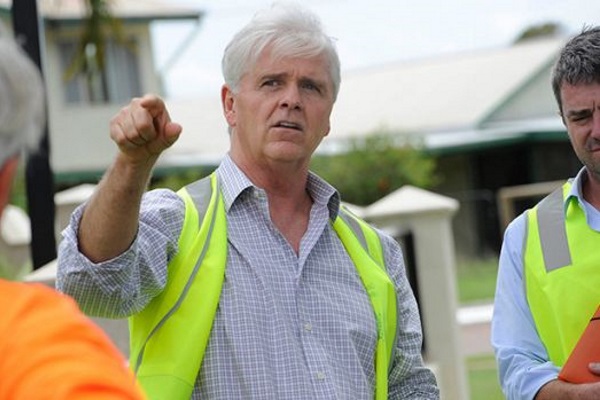Published on the 26/10/2017 | Written by Jonathan Cotton

Bill Morrow leaps into print to defend NBN rollout from Kiwi comparisons (but fails to nail the landing)…
The CEO of NBN Co, has, against common sense, better judgement and perhaps self-interest, laid his cards on the table in ‘Australia & New Zealand broadband: Comparing apples with oranges…’
Bill Morrow’s lengthy tome said the constant comparisons critics make between the disastrous NBN rollout and the comparatively smooth New Zealand broadband project are unfair.
“One of the questions we get asked most often at NBN is why we don’t just follow the model of broadband deployment being delivered in New Zealand,” said Morrow.
He then takes us, point by precarious point, through what he sees as seven key differences between these fair shores and those. Read at length here or press on for our condensed version.
In short then, according to Morrow, the differences between the troubled NBN project and NZ’s successful deployment are:
- The ownership model is different. In New Zealand, Chorus owns the infrastructure and won the vast majority (well, around 70%) of the work to build FttP networks, so it could use those assets to build the fibre network on the cheap. In Australia, the government doesn’t have that infrastructure and must lease it from Telstra (that’s Chorus, the publicly listed network company split off from Telecom, New Zealand’s equivalent of Telstra, in 2011).
- In New Zealand, Chorus already had a near-nationwide Fibre-to-the-Node (NBN) network in place delivering speeds of between 30–100Mbps, meaning it was easy to move from NBN to FttP. Nothing of the kind exists in Australia.
- New Zealand shifts from NBN to FttP whereas Australia has to shift from ADSL to FttP. The former is cheap, the latter expensive.
- In New Zealand, a significant amount of the FttP network can be delivered aerially. The NBN however can only deliver 15% of the lead-ins aerially, meaning the majority of Australian FttP networks are delivered underground, a more expensive option.
- In Australia, most fixed-line legacy services will be switched off 18 months after an area is made ready for service – New Zealand does not have this, meaning Chorus also has the luxury of allowing premises that would be difficult to connect to FttP to remain on their NBN networks.
- Australia is big and New Zealand is small.
- New Zealand has not implemented a data consumption charge on their network in the same way that NBN did with the Connectivity Virtual Circuit (CVC) charge. On the NBN access network, end-user experience can be negatively impacted if retailers don’t buy sufficient CVC. “We are working to address this,” said Morrow.
Long story short, the crux of Morrow’s argument is this: Comparing the seamless Kiwi rollout with the ongoing trainwreck of the NBN is like comparing “apples and oranges”. When it comes to getting broadband to people’s homes, Kiwis have multiple crucial advantages, argued Morrow.
To say some are not convinced is putting it mildly.
“Bill Morrow is awfully good at finding excuses to paper over the failings of the corporation he heads,” jeered Sam Varghese for IT Wire.
“He has forgotten one important feature in which the two roll outs differ – and that is the professionalism shown by Chorus. When installers from this company come to the premises of a New Zealander, they only leave once the connection there is working. They do not just run some fibre to the premise, complete that bit of work and leave the rest to the resident or the ISP in question.”
Associate engineering professor and managing editor of the Australian Journal for Telecommunications and the Digital Economy Mark Gregory weighed in with, “Bill Morrow has attempted to deflect criticism of the National Broadband but ended up highlighting the parlous state of the project.”
“His recent statements about why the NBN is a mess have added little to the conversation other than galvanise concerns about the future of the project. The multi-technology NBN is a lemon and something needs to be done before it is too late.”
“Malcolm Turnbull has presided over the biggest infrastructure blunder in this nation’s history. The change from full fibre to multi technology mix was an error that has sent NBN Co to the wall. It happened on his watch and he is responsible.”
Telco consultant Paul Budde didn’t make it personal, but nevertheless savaged the whole state of affairs on his blog, deriding the “blame game” and saying that “the main blame should go to the current government, which changed horses in midstream and then put forward a second-rate solution that, among other things, resulted in a ban on competitors being allowed to roll out superior FttH broadband services. Who would have thought such a policy could come from a pro-business liberal government?”
“Stop the rollout of the NBN and replace it with FttC (fibre to the curb),” he advises. “The more money spent on NBN will only make the NBN less valuable and continue the waste of taxpayers’ money. If the price for this is a delay of another one or two years so be it – better to do it right.”
But perhaps the most withering criticism has come by way of Prime Minister Malcolm Turnbull who, on Monday, said that “the project was a mistake” and a “massive waste of money”.
“If you want to look at a country that did this exercise better, it’s New Zealand, and what they did there was ensure the incumbent telco, the Telstra equivalent, split network operations from retail operations and that network company became, in effect, the NBN,” he said.
Yes, that, but New Zealand also introduced a competitive network installation market instead of a monolithic State owned enterprise.
“At the moment, it is estimated to deliver a return of around 3 percent….It is enough to keep it on the government’s balance sheet, as a government asset, but it certainly is not a commercial return that the stock market would expect.”
Actually, the crown asset is Crown Fibre Holdings which is the investment vehicle which funds the companies implementing the UFB network. Chorus is publicly listed on the NZX.
As scrutiny of the NBN project continues (seemingly endlessly) to mount – and with Morrow facing some particularly direct questioning at a Senate hearing yesterday – it’s increasingly apparent that things are unlikely to right themselves without some sort of radical intervention.
Morrow’s seeming obliviousness to that fact is disheartening.
“We are confident we are managing our costs efficiently and comparing Chorus to NBN is interesting,” he said, “but ultimately not particularly helpful”.
While Morrow is likely alone in that confidence, the second part of his sentence, at least, has us convinced.



























